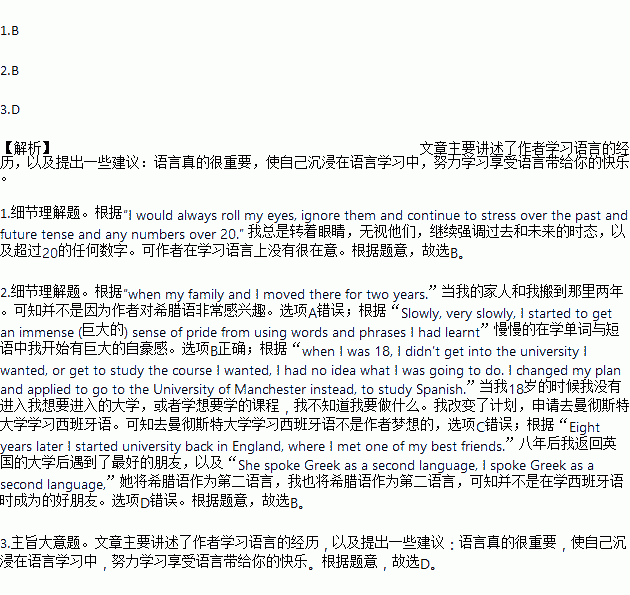题目内容
“Languages are important,” “I know they’re hard but don’t give up,” “They’ll help you in life”.
I was told these words of encouragement over and over again, I would always roll my eyes, ignore them and continue to stress over the past and future tense and any numbers over 20.
I have studied languages from a young age. I began learning Greek aged 10. when my family and I moved there for two years. At first it was difficult and I had no idea whether I would be able to learn the language and use it productively, but eventually it started to make sense.
Slowly, very slowly, I started to get an immense (巨大的) sense of pride from using words and phrases I had learnt, overhearing (偷听) conversations and (almost) understanding everything that was said.
Eight years later I started university back in England, where I met one of my best friends. Guess how we became best friends? She spoke Greek as a second language, I spoke Greek as a second language, that was our conversation starter. We went for coffee and from that moment we were inseparable. I was always told I would meet people through languages and it would open up doors for me, and that was one of the first moments where I believed it. Sometimes it comes down to something small like that, to make you realise what you’re doing is 100 percent worth it.
I was encouraged by my family to continue on the language path since I started learning at the age of 10, so I took up German and it was really challenging. There were a lot of times I thought I was going to give up, but I am so glad I didn’t; when I was 18, I didn’t get into the university I wanted, or get to study the course I wanted, I had no idea what I was going to do. I changed my plan and applied to go to the University of Manchester instead, to study Spanish. I had never studied Spanish before; they saw that I had studied Greek and German and offered me a place! Now I am in Spain for a year having an amazing time and enjoying the sunshine, working as an English language assistant in a lovely little primary school.
It was a wonderful chain of events; if I had ignored everybody who encouraged me to study languages, gave up when it was hard and didn’t practice, I would not be doing what I am doing right now, and ray life would be totally different. I’m glad I listened.
My advice: it’s true, languages arc important, immerse (使沉浸于) yourself in them, work hard and enjoy the benefits (because there are a lot!).
1.When offered tips on learning languages, the author •
A. kept them in mind carefully
B. didn’t pay any attention to them
C. tried to test whether they were true or not
D. would react with a huge sense of pride.
2.Which of the following statements is TRUE about the author?
A. She started learning Greek because of her strong interest in it.
B. She fell in love with the Greek language as she slowly mastered it.
C. She dreamt of learning languages at the University of Manchester.
D. She met her best friend in her Spanish language class.
3.What is the article mainly about?
A. The most effective way to learn a second language.
B. The difficulties the author once had in learning languages.
C. The importance and advantages of learning a second language.
D. The author’s language learning experiences and how she benefited from them.


 ),并在其下面写出该加的词。
),并在其下面写出该加的词。